
》北某新貂大睾现代远程教育 Unit 12 What Would You Like to Order? Speaking Development Situational Dialogues Learn to Communicate Pronunciation and Intonation
Unit 12 What Would You Like to Order? Speaking Development • Situational Dialogues • Learn to Communicate • Pronunciation and Intonation
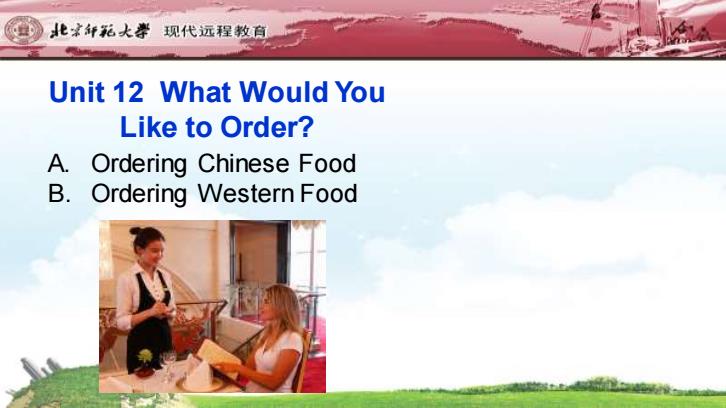
》北新大现代远程教育 Unit 12 What Would You Like to Order? A.Ordering Chinese Food B.Ordering Western Food
Unit 12 What Would You Like to Order? A. Ordering Chinese Food B. Ordering Western Food

ituational Dialogues Pungent ['pAnd3ant] A adj.辛辣的;刺激性的of a strong, sharp smell or taste which is often so Specialty:招牌菜;特色食品,特产 Silk is t village Sauteed: [sau'terd] 专业, 快炒的;清炒的:嫩煎的:香 His spe 煎的 的专训 sauteed pork炒猪肉 specialties,they are,sauteed pork and mapo bean curd
Situational Dialogues A. Ordering Chinese Food true (T)or false (F) □ 1.The restaurant serves only Chinese food. □ 2.The customer doesn’t know what each dish like. □ 3.The customer wants to try Sichuan food because it is pungent. □ 4.At last the customer orders two specialties, they are, sautéed pork and mapo bean curd. Pungent [‘pʌndʒənt] adj.辛辣的;刺激性的of a strong, sharp smell or taste which is often so strong that it is unpleasant. The taste is bitter and disagreeably pungent. 味道既苦又辣得呛鼻。 the pungentsmell of burning rubber 烧橡胶的刺鼻气味 Specialty: 招牌菜;特色食品,特产 Silk is the specialty of this village. 丝绸是这村子的特产 专业,专长 Hisspecialty is international law. 他 的专业是国际法 Sautéed: [səʊ'teɪd] 快炒的;清炒的;嫩煎的;香 煎的 sautéed pork 炒猪肉
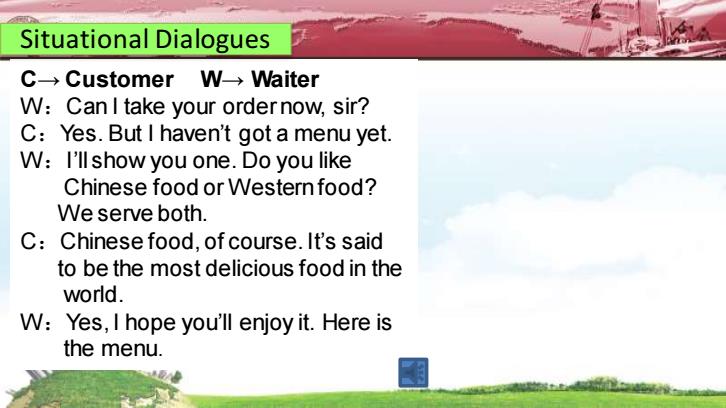
Situational Dialogues C→Customer W→Waiter W:Can I take your ordernow,sir? C:Yes.But I haven't got a menu yet. W:I'll show you one.Do you like Chinese food or Western food? We serve both. C: :Chinese food,of course.It's said to be the most delicious food in the world. W:Yes,I hope you'll enjoy it.Here is the menu
C→ Customer W→ Waiter W:Can I take your order now, sir? C:Yes. But I haven’t got a menu yet. W:I’ll show you one. Do you like Chinese food or Western food? We serve both. C:Chinese food, of course. It’s said to be the most delicious food in the world. W:Yes, I hope you’ll enjoy it. Here is the menu. Situational Dialogues
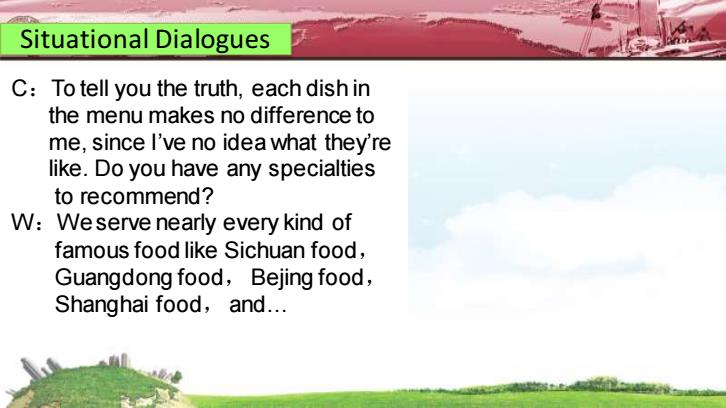
Situational Dialogues C:To tell you the truth,each dish in the menu makes no difference to me,since I've no idea what they're like.Do you have any specialties to recommend? W:Weserve nearly every kind of famous food like Sichuan food, Guangdong food,Bejing food, Shanghai food,and.…
C:To tell you the truth, each dish in the menu makes no difference to me, since I’ve no idea what they’re like. Do you have any specialties to recommend? W:We serve nearly every kind of famous food like Sichuan food, Guangdong food,Bejing food, Shanghai food,and… Situational Dialogues
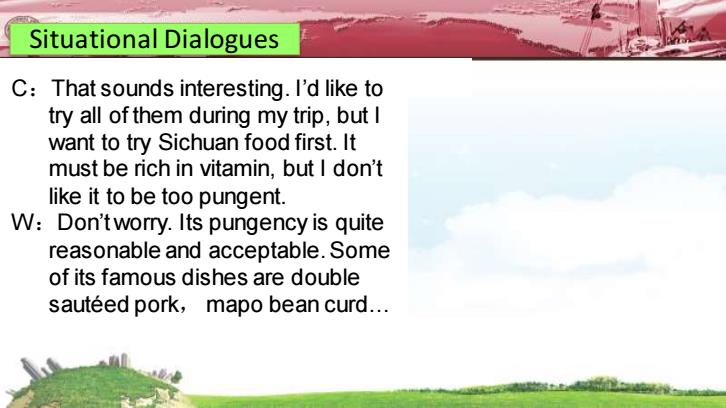
Situational Dialogues C:That sounds interesting.I'd like to try all of them during my trip,but I want to try Sichuan food first.It must be rich in vitamin,but I don't like it to be too pungent. W:Don't worry.Its pungency is quite reasonable and acceptable.Some of its famous dishes are double sauteed pork,mapo bean curd
Situational Dialogues C:That sounds interesting. I’d like to try all of them during my trip, but I want to try Sichuan food first. It must be rich in vitamin, but I don’t like it to be too pungent. W:Don’t worry. Its pungency is quite reasonable and acceptable. Some of its famous dishes are double sautéed pork, mapo bean curd…

Situational Dialogues C:Well,thank you.Just bring me three of your specialties.I'd like to listen to your introduction when you serve them. W:OK.They'll be ready in a few minutes
Situational Dialogues C:Well,thank you. Just bring me three of your specialties. I’d like to listen to your introduction when you serve them. W:OK. They’ll be ready in a few minutes
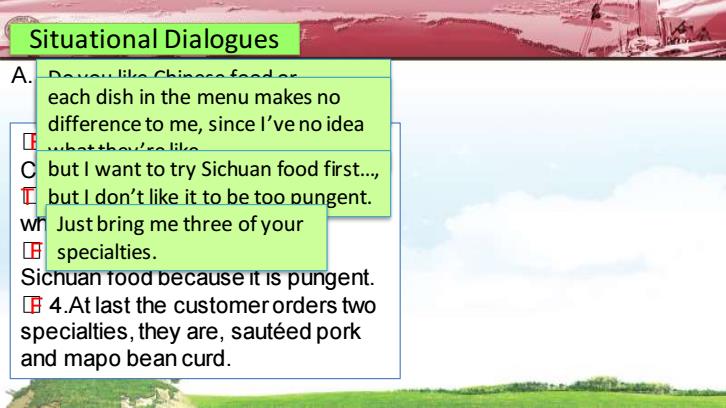
Situational Dialogues A lilcki。f。A each dish in the menu makes no difference to me,since I've no idea 正 wkattheulelile C but I want to try Sichuan food first..., but I don't like it to be too pungent. wn Just bring me three of your specialties. Sichuan tood because it is pungent. 4.At last the customer orders two specialties,they are,sauteed pork and mapo bean curd
Situational Dialogues A. Ordering Chinese Food true (T)or false (F) □ 1.The restaurant serves only Chinese food. □ 2.The customer doesn’t know what each dish like. □ 3.The customer wants to try Sichuan food because it is pungent. □ 4.At last the customer orders two specialties, they are, sautéed pork and mapo bean curd. Do you like Chinese food or Western food? We serve both. F each dish in the menu makes no difference to me, since I’ve no idea what they’re like. T but I want to try Sichuan food first…, but I don’t like it to be too pungent. F Just bring me three of your specialties. F
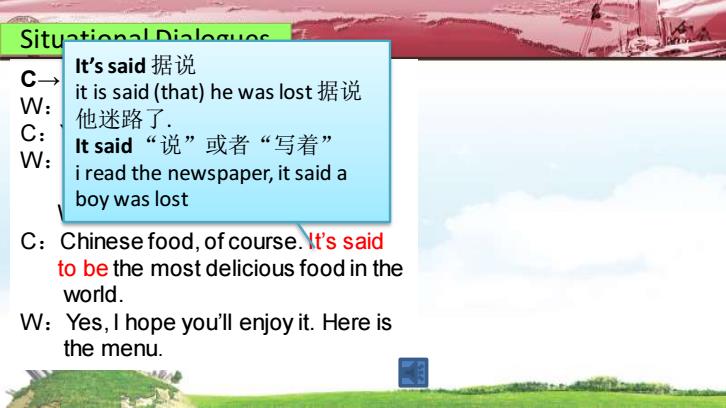
It's said据说 C→ W: it is said(that)he was lost据说 C: 他迷路了. It said“说”或者“写着” W: i read the newspaper,it said a boy was lost C: Chinese food,of course.It's said to be the most delicious food in the world. W:Yes,I hope you'll enjoy it.Here is the menu
C→ Customer W→ Waiter W:Can I take your order now, sir? C:Yes. But I haven’t got a menu yet. W:I’ll show you one. Do you like Chinese food or Western food? We serve both. C:Chinese food, of course. It’s said to be the most delicious food in the world. W:Yes, I hope you’ll enjoy it. Here is the menu. Situational Dialogues It’s said 据说 it is said (that) he was lost 据说 他迷路了. It said “说”或者“写着” i read the newspaper, it said a boy was lost
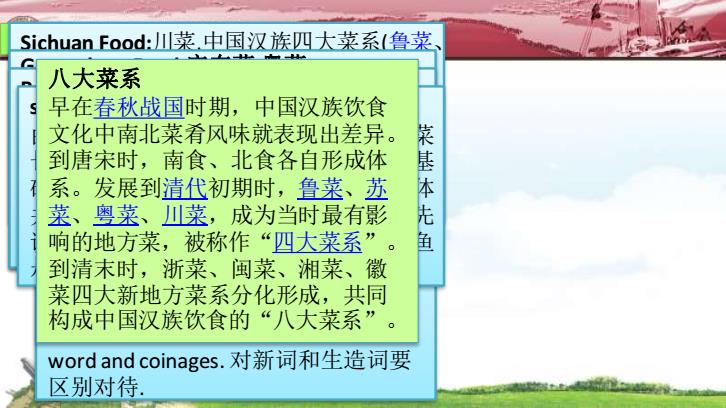
Sichuan Food:川菜,中国汉族四大菜系(鲁菜 八大菜系 早在春秋战国时期,中国汉族饮食 文化中南北菜肴风味就表现出差异。 到唐宋时,南食、北食各自形成体 菜基 系。发展到清代初期时,鲁菜、苏 本 菜、粤菜、川菜,成为当时最有影 响的地方菜,被称作“四大菜系”。 鱼 到清末时,浙菜、闽菜、湘菜、徽 菜四大新地方菜系分化形成,共同 构成中国汉族饮食的“八大菜系”。 word and coinages.对新词和生造词要 区别对待
C:To tell you the truth, each dish in the menu makes no difference to me, since I’ve no idea what they’re like. Do you have any specialties to recommend? W:We serve nearly every kind of famous food like Sichuan food, Guangdong food,Bejing food, Shanghai food,and… Situational Dialogues make no difference:没有影响,都一样 It make no differenceto me whether you go or not. 你去不去对我都一样. make a difference:有影响;起(重要)作用 Dose his absence make a difference to your work? 假如没有他,对你的工作会 有影响吗 ? We make a difference between new word and coinages. 对新词和生造词要 区别对待. Sichuan Food:川菜,中国汉族四大菜系(鲁菜、 苏菜、粤菜、川菜)之一,它取材广泛,调 味多变,菜式多样,口味清鲜醇浓并重, 以善用麻辣著称,川菜以家常菜为主,取 材多为日常百味,其特点在于红味讲究麻、 辣、香.著名代表菜品有:鱼香肉丝、回锅 肉、麻婆豆腐、水煮鱼、夫妻肺片等 Guangdong Food:广东菜,粤菜 广义由广州菜、东江菜、潮州菜(也有被 归入闽菜)发展而成,以潮州菜为代表, 在烹调上以炒、爆为主,讲究清而不淡, 鲜而不俗,嫩而不生,油而不腻。时令性 强,夏秋尚清淡,冬春求浓郁。粤菜著名 的菜点有:鸡烩蛇、龙虎斗、烤乳猪、太 爷鸡、盐焗鸡、白灼虾、白斩鸡、烧鹅等 Beijing Food: 京菜中,最具有特色的要算 是烤鸭和涮羊肉。涮羊肉、烤牛肉、烤羊 肉原是北方少数民族的食法,辽代墓壁画 中就有众人围火锅吃涮羊肉的画面。北京 以都城的特殊地位,集全国烹饪技术之大 成,不断地吸收各地饮食精华,吸收了汉 满等民族饮食精华的宫廷风味 shanghai Food: 沪菜 即上海菜 由于上海本地菜(包括苏锡菜)与外地菜 长期共存,相互影响,便在原本地菜的基 础上逐渐发展成以上海和苏锡风味为主体 并兼有各地风味的上海风味菜体系。首先 讲究选料新鲜。它选用四季时令蔬菜,鱼 是以江浙两省产品为主,取活为上. 八大菜系 早在春秋战国时期,中国汉族饮食 文化中南北菜肴风味就表现出差异。 到唐宋时,南食、北食各自形成体 系。发展到清代初期时,鲁菜、苏 菜、粤菜、川菜,成为当时最有影 响的地方菜,被称作“四大菜系”。 到清末时,浙菜、闽菜、湘菜、徽 菜四大新地方菜系分化形成,共同 构成中国汉族饮食的“八大菜系